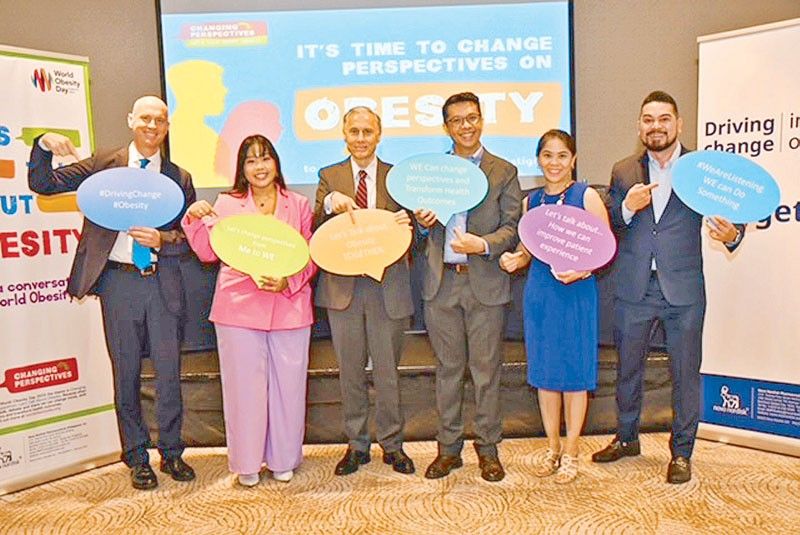Body Positivity advocate Mia Rieza on battling obesity


Growing up, she was led to believe that her self-worth revolved around her weight.
The saddest part? All the demeaning words thrown at her — by relatives and classmates —over the years had managed to convince her that she wouldn’t amount to anything as long as she tipped the scale.
“For most of my life, I thought that my purpose was to lose weight — in order to fit in, to be successful, and to find my prince charming,” model and content creator Mia Franz-Gelicka Rieza shares.

Mia was a chubby kid and often got called names in school. But the occasions she dreaded the most were family gatherings.
“I hated seeing certain relatives because the first thing they would always comment on was my body,” relates Mia. “I remember having to mentally prepare myself to smile and laugh at their jokes. My grandmother even told me that no one would ever have a crush on me because I was fat.”
They may have been merely joking, but as a kid, Mia believed them. And from that moment on, the idea that she needed to lose weight in order to be liked was planted in her mind.
The younger Mia suffered from unhealthy eating habits and practices. She would skip meals only to end up binge eating after.

“I would punish my body by working out till exhaustion,” she says. “I remember being sent home from school due to extreme stomach ache.”
Mia was in so much pain, but “I was happy because I looked thin,” she adds. She was stuck in this cycle and fell deeper and deeper to the point that she couldn’t see any meaning to her life.
“I didn’t really understand that in the pursuit of weight loss, I was actually harming my body,” Mia adds.
And that served as her wakeup call.
“I wasted too many years chasing after a beauty standard because I thought becoming thinner meant that I would be loved, cared for, and respected,” she says.
To inspire and educate fellow women who are struggling with their weight, Mia turned to TikTok.
“I wanted to reach out to those women who had similar experiences when it comes to body shaming,” she explains. “Things are normalized the more we see of it. I became comfortable in my own body because I saw other women find comfort in theirs.”
Mia was surprised at how fast her body positivity videos took off. Of course, there are still bashers, but Mia no longer feels the need to prove herself.
“Growing old is a gift because it brings clarity,” Mia shares. “I’ve grown to love, care for, and respect my own body because it’s my home, and it is the same body that will help me achieve all my dreams.”
The roots of obesity runs deep
We live in a society where physical appearance is given more value, and many people who suffer from obesity like Mia are constantly shamed and blamed for it. This is because most of them — including your neighbor “Maritess,” policy makers, even doctors — do not realize that obesity is a chronic disease. They see it as lack of willpower, laziness, or a refusal “to eat less and move more.”
Studies show that 40 percent of people living with obesity experience judgment and humiliation, making them feel ashamed to ask for help.
In the Philippines, the burden of obesity continues to rise, with the prevalence among adults doubling in the past decade.
Nearly four out of 10 adults are overweight or obese, putting them at risk of developing type 2 diabetes and other chronic diseases.
Changing perspectives
Medical organizations like Novo Nordisk Philippines recognizes the urgent need for action and aims to educate patients, doctors, and stakeholders on the psychological aspects of obesity, and the hope of defeating this chronic disease.
This was the resounding clamor of multi-sectoral groups pushing for a better understanding of obesity, which impacts around 650 million people around the globe during the observance of World Obesity Day (WOD) held recently at Shangri-La at The Fort.
This year’s WOD carried the theme, “Changing Perspectives: Let’s Talk About Obesity.” The goal was to correct misconceptions, end stigmas, and get everybody making the decision to shift from single views to shared strategies.
Obesity conspirators
“Obesity has so many causes,” says Dr. Joy Arabelle Fontanilla, endocrinologist, and head of Weight Intervention & Nutrition Services, St. Luke’s Medical Center, BGC. “I call them obesity conspirators. There are so many factors conspiring so that a person gains weight. It has something to do with biology, your hormones, chemical imbalances, sleep deprivation, the environment, and genes. In fact, 40 to 70 percent of obesity can be explained by genetics.”
Understanding these factors is critical, because obesity is associated with other diseases, not to mention the stigma and bias millions suffer every day.
There are so many people suffering from obesity, but not all of them seek medical help. The reason?
“We could start with how Filipinos look at themselves,” notes Dr. Nemesio Nicodemus Jr., professor, UP College of Medicine and president, Philippine Association for the Study of Overweight and Obesity (PASOO). “There’s a thing called weight bias because of how society paints obesity. People living with obesity start having negative attitudes and beliefs about themselves or others.”
From weight bias, it develops into something more social and acceptable to do, which in turn leads to obesity stigma.
“And that stigma leads to discrimination,” Dr. Nicodemus says. “People dealing with weight issues are marginalized and excluded just because of their weight. The number also discouraged them from coming out and talking about obesity.”
In schools and workplaces, half of those living with obesity are excluded. In the health profession, as much as 69 percent of patients feel that their healthcare professionals have not been actually seeing them in a more positive light, which all the more discourages some of them from seeking medical help.
“I sought the help of a medical professional because of shoulder pain,” shares Mia. “I was working out at that time and I thought the pain was caused by an injury.”
But instead of looking into the problem, the ortho Mia consulted assumed that the pain was caused by her weight.
“He didn’t even look at my shoulder. He just assumed that my problem was caused by diabetes or obesity,” Mia laments.
The stigma and discrimination associated with obesity can lead to psychological distress.
“Addressing the mental health effects of obesity is crucial in providing comprehensive care and support to individuals affected by this chronic disease,” notes Dr. Edgardo Tolentino Jr., psychiatrist.
And so, by changing the narrative and battling stigma as a first step, these organizations aim to change the way obesity is treated as a disease.
It takes a village to fight obesity
Novo Nordisk recognizes the importance of addressing the psychological aspects of obesity and encourages patients, doctors, and stakeholders to join the conversation and break the stigma surrounding the disease.
“At Novo Nordisk, we believe in driving change in obesity by providing innovative treatments, supporting research and education, and collaborating with stakeholders across the healthcare ecosystem,” notes Novo Nordisk vice president and general manager Cihan Serdar Kizilcik. “We are committed to empowering individuals affected by obesity to live healthier and fulfilling lives.”
Let’s take the first step in changing the narrative around obesity by checking your BMI today.
***
Visit the Truth About Weight website to use their BMI calculator and get the information you need to start the conversation with your doctor about prevention, management, and treatment options.



















